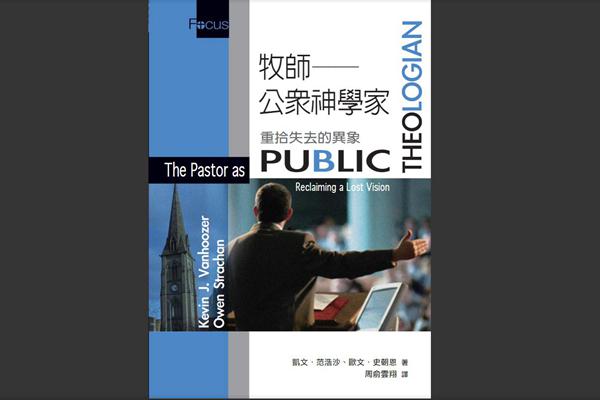Most Christians seek the help of pastors only when they have questions about faith. Pastors tend to forget their mission to form the life of Christ in believers when they are busy helping believers with other things. In our age, the original role played by pastors has been replaced by something far from their original purpose.
Authors Kevin and Owen studied how this crisis redefined a pastor's role and looked into the definition of being a pastor in the Bible and throughout history.
The definition reached by the authors is a great warning to the Chinese church.
I will sum up the key points of the book in the context of Chinese churches' situation.
First, a pastor is a public figure who understands and acts in society.
Kevin believes that pastor should be an evangelical public intellectual. Today, society cannot hear a pastor's voice at all as they only work in the "church." Kevin has an in-depth understanding of the duties of a pastor as cited in the book. A pastor should be called the pastor theologian, understanding theology and having the skills to shepherd a church. He must also care for all kinds of issues in the society for he knows clearly that Christ died for the world.
I felt excited on reading Kevin's definition of a pastor. Pastors have the tasks of prophets, priests and kings. For example, John the Baptist was viewed as a pastor by Kevin and points out the sins of people are sharp regardless of their status. Pastors should be able to explain to believers as Moses did why they need to get out of Egypt and represent the challenges of the secular world.
The vision of human prosperity and public interest are the main things that Christian faith brings into the public. Perhaps due to the special circumstances in the country, the Chinese church pastors generally have no social influence. This instance was caused by their ecclesiology: limiting faith in the church only and distancing it from the society. Many pastors only have shallow understanding of God's love, only caring about their personal relationship with God. As a result, they cannot think big in mission and expanding their prayers to encompass other things. It has been wrongly believed that a Christian's faith is a personal matter and that it has nothing to do with participating in the society.
Today's pastors greatly lack the understanding of John Wesley that the world is the mission field. They preach the God of the whole universe only in the church's buildings. In most of the Chinese churches located in countryside, the tasks of pastors are only about faith which is limited in the Bible and church.
Second, theology and shepherding must go together.
William Willimon saw a crisis: "Modern service has suffered from the unbiblical notion that leaders should become the chief executive, psychotherapist, or political motivators. The root of the crisis is that pastors have not realized that their vision does not come from the Bible, but from the world: believing that faith is only a need for people". The authors mentions in the book that in the early church, subjects taught in seminaries were not divided into so many subjects as we have today, and a pastor means that he has a good thinking mind and the gift of teaching like a theologian. The present division of theology into biblical, history, systematic and practical theology was from a theologian in Germany. Among the four subjects, only the last one is related to the reality of the church. The authors see the potential danger in it that it may cause trained pastors to lack a comprehensive understanding of theology while pastors need to deal with all areas of life.
Without doubt, the depth of a pastor's theological training will determine his power to shepherd churches. However, today, very few would connect being a pastor to being a theologian as many stress they do not have any tasks in common. Pastors who devote his time fully to church's administration work and ministries do not have time for further study of theology. They cannot offer lasting and effective service before God.
Third, pastor himself must be good at thinking and reading books
The authors have listed many good examples of pastor-theologian that others could emulate such as Augustiine, Martin Luther and Calvin. The word "Pastor" is a metaphor coming from a Latin root which means shepherd. It means that pastor must understand the lamb's situation deeply and the dangers they face. To be a pastor, he must have a clean heart and good skills which need continuous study and improvement. Pastors should become a public intellectual theologian whose task is to build up those in Christ.
The authors hold that pastor should like reading, be sensitive to the practical needs of society and able to think about them theologically. The book talks about how the church should view technology from the Bible's perspective in one chapter. That is the authors' effort to understand everything from the Bible. The authors thinks that the church should accept the benefit of it and guard against its potential dangers and temptations.
The pastor is a public theologian who helps people understand God, with the aim of establishing them in Christ. Cornelius Pranlinger thinks that a pastor should read books for sermons because reading makes people wise. Pralinger loves reading himself. Apart from reading theology books and philosophy books, he loves reading novels as well. Novels reveal the problems of society, though it may appear to be simple in nature. Reading novels can improve a pastor's preaching capacity for they help pastors to depict the image of Christ more accurately.
Unfortunately, many of today's Chinese shepherds rely on their own intelligence without studying from others. It is clear that some of them choosing to avoid looking at certain problems of society or looking at them negatively tend to lack a basic understanding of culture. The author believes that refusal to study is either out of arrogance or out of pride. Due to a lack of basic understanding of culture, many pastors choose to deal with only lighter problems. Their understanding of society is very shallow for they do not have a whole understanding of the Bible nor do they realize the principle that effective mission results from mutual understanding brought by good communication.
Paul's understanding of Jewish theology and Greek philosophy has aided him greatly as an apostle to the Gentiles. But many Chinese pastors resent engaging in academic discussions, and for the more complex issues in discussions, they suggest using prayers to solve them. Their refusal to study shows their arrogance, which has blinded them of the true meaning of their mission.
Augustine never refuses discussion and questions, and treat the opponent's legitimate response as the greatest help to his writing. In his book "On the Trinity", Augustine wrote honestly: "my dear reader, wherever you are sure as I am sure, please go with me. Wherever you have doubts as me, let us discuss together. If you find your own fault, please come to me and if you find my fault. Please help me to come to you so that we may walk on the great path of love."
The book can actually by called the pastor's many faces. All pastors in Christ should read this book carefully to have a self-check. I hope more pastors-theologian appear in China who can represent the church to speak to our society and express appropriately the truth of Christ. A pastor's work has never been self-talk but teaching a group of people in need of eternal life with clarity.
Translated by Alvin Zhou










